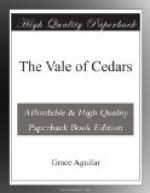The effects of that agitating interview between father and daughter had been visible to Ferdinand; but he attributed it, very naturally, to the cause privately assigned for it by his kinsman—Marie’s first conviction that her father’s days were numbered. He had been greatly shocked at the change in Henriquez’s appearance, and deeply affected at the solemn and startling earnestness with which he consigned his child to his care, beseeching him, under all circumstances, to love and cherish her. His nephew could scarcely understand, then, such earnest pleadings. Alas! ere his life closed, their cause was clear enough.
Unconscious that her father and cousin were together, or of the nature of their conversation, Marie had joined them, unexpectedly, ere the interview was over. From her father’s lips, and in a tone of trembling agitation, she heard that his long-cherished prayer was granted, and that she was his nephew’s plighted, bride. He joined their hands, blessed them, and left them alone together, ere she had had power to utter a single word; and when voice was recalled by the tender, earnest accents of her cousin, beseeching her to ratify her father’s consent—to say she would learn to love him, if she did not then; that she would not refuse the devotedness he proffered—what could she answer? She had so long loved him, venerated him, gloried in his achievements, his honors, as of an elder and much-loved brother, that, had she followed the impulse of her nature, she would have thrown herself as a sister on his neck, and poured forth her tale of sorrow. But she had sworn to be guided by her father, and he had besought her to reveal nothing; and therefore she promised to be his, even while with tears she declared herself unworthy. But such words were of little meaning to her enraptured lover save to bid him passionately deny them, and excite his ardent affection more than ever—satisfied that she could be not indifferent, listening as she did, with such flushed cheek and glistening eye, to the theme of his life since they had parted—the favor of the sovereigns, and the station he had won.
During the two months which intervened between Don Ferdinand’s departure and promised return, Marie strained every nerve to face her destiny, and so meet it with calmness. Had she not loved, it would have been impossible to feel herself the cherished object of her cousin’s love without returning it, possessing, as he did, alike inward and outward attraction to win regard. She studiously and earnestly banished every thought of Arthur as it rose; she prayed only for strength to be faithful, not only in outward seeming but in inward thought; that Stanley might never cross her path again, or, if he did, that his very affections might be estranged from her; that the secret she had revealed might alone be thought upon, till all of love had gone. The torture of such prayer, let those who love decide; but it was the thought of his woe, did he ever know she was another’s bride, that haunted her. Her own suffering it was comparitively easy to bear, believing as she did, that they were called for by her involuntary sin: but his—so successfully had she conquered herself; that it was only when his countenance of reproach would flit before her, that the groan burst from her heart, and she felt bowed unto the earth.




